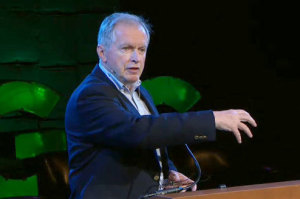Wycliffe CEO Explains Importance of 'Unconditional Love' in Bible Translation
Correction appended
Wycliffe Bible Translators CEO and President Bob Creson in a recent letter revealed the true story of teaching the Hdi people of West Africa the word for God's unconditional love, a moment which forever changed the dynamic within the community for the better.
Creson, whose organization opens 75 new translation projects per year, spoke with The Christian Post to discuss the importance of "unconditional love" when translating the Bible, and both the spiritual and practical ways that the Scriptural Word of God can change a community.
Creson's letter focuses primarily on the topic of unconditional love, re-telling the story of a few years ago when bible translators for the Mbam cluster of languages asked the Hdi people of Cameroon in West Africa what their word for "unconditional love" was.
Although the Hdi people had a word for temporary love and conditional love in their native tongue, they lacked a word for unconditional love, a term which explains one of the main tenants of the Christian faith.
As Creson told CP, "unconditional love" is one of the "key terms especially important and foundational to Scripture," as "describing God's love is always important to the translation process."
"The extent that God would go to in creating a relationship with us can only be described through the story found in John 3:16: 'For God so loved the world that he gave his one and only Son,'" Creson explained to CP.
Creson added that the word for unconditional love, whether it is found or created in a language, is the only one appropriate for "that deep love," the one which explains "the extent to which God would go for one person."
By learning such words as unconditional love, along with the full translation of the Bible, communities around the world change both spiritually and practically, according to Creson. "The scriptures transform lives […] we see people's lives change dramatically," Creson said, adding that once the Bible is translated for a society, moral issues such as prostitution, anger management, and armed robbery tend to decrease dramatically.
Additionally, Bible translations have a practical effect on society, in that helping people learn to read and write in their own language "opens them up for the opportunity to understand visual information, like health needs."
For example, if Bible translators teach a mother to read and write in her native tongue, she's dramatically more effective in helping her children because she can understand written health information.
Wycliffe Bible Translators has been sharing God's word with the world since 1942, and is currently focusing its efforts in Africa, Asia, Northern India, China, and Indonesia, both translating the Bible for various language groups as well as using cluster projects to help national colleagues become leaders in their country.
With more translation projects in progress than translation needs, Creson told CP that the company's goal of having a Bible translation project in every country by 2025 is quickly becoming a reality.
The translation of the New Testament section of the bible for the Mbam cluster languages of West Africa has been completed, and will be dedicated at the end of 2013.
Correction: Wednesday, Feb. 6, 2013:
An earlier version of this article incorrectly identified a people group in West Africa as Hidi. The correct term is Hdi.





























